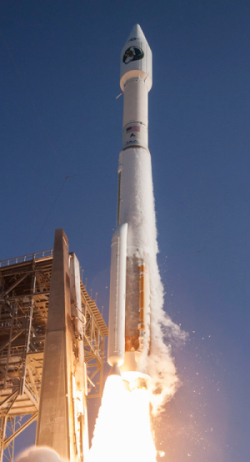SpaceX test fires one of its recovered first stages
The competition heats up: SpaceX has completed a full duration test firing of one of its recovered first stages.
The JCSAT-14 stage [which was the third recovered stage and the second to land on a barge] isn’t expected to fly again due to the initial evaluations into damage received via its high-velocity return. However, it will still provide useful test data. “Most recent rocket took max damage, due to very high entry velocity,” noted Elon Musk. “Will be our life leader for ground tests to confirm others are good.”
That testing on the JCSAT-14 booster began on Thursday, with the stage placed on the test stand at McGregor – ironically after the stand was vacated by the JCSAT-16 first stage – which recently completed testing and has since been shipped to Florida for its launch next month. The returned stage is also sported a new cap, which may be providing some simulated weight to aid the required data gathering during the test firing.
The booster conducted a long firing of 2 minutes 30 seconds (the duration of first stage flight), that began around 7pm local time on Thursday (per L2 McGregor), which will provide vital data on the returned stage as SpaceX continue preparations for validating one of its recovered booster for a re-launch later this year.
It is once again important to point out that SpaceX’s engineers here have an enormous advantage over every other rocket engineer who has ever lived. They have in hand a recovered first stage that was actually used to launch a satellite into orbit, giving them the ability to test it and find out precisely how such equipment fares during launch. This will give them the ability, unavailable to others, to make engineering improvements that will make future first stages even more reliable and reusable.
The competition heats up: SpaceX has completed a full duration test firing of one of its recovered first stages.
The JCSAT-14 stage [which was the third recovered stage and the second to land on a barge] isn’t expected to fly again due to the initial evaluations into damage received via its high-velocity return. However, it will still provide useful test data. “Most recent rocket took max damage, due to very high entry velocity,” noted Elon Musk. “Will be our life leader for ground tests to confirm others are good.”
That testing on the JCSAT-14 booster began on Thursday, with the stage placed on the test stand at McGregor – ironically after the stand was vacated by the JCSAT-16 first stage – which recently completed testing and has since been shipped to Florida for its launch next month. The returned stage is also sported a new cap, which may be providing some simulated weight to aid the required data gathering during the test firing.
The booster conducted a long firing of 2 minutes 30 seconds (the duration of first stage flight), that began around 7pm local time on Thursday (per L2 McGregor), which will provide vital data on the returned stage as SpaceX continue preparations for validating one of its recovered booster for a re-launch later this year.
It is once again important to point out that SpaceX’s engineers here have an enormous advantage over every other rocket engineer who has ever lived. They have in hand a recovered first stage that was actually used to launch a satellite into orbit, giving them the ability to test it and find out precisely how such equipment fares during launch. This will give them the ability, unavailable to others, to make engineering improvements that will make future first stages even more reliable and reusable.

